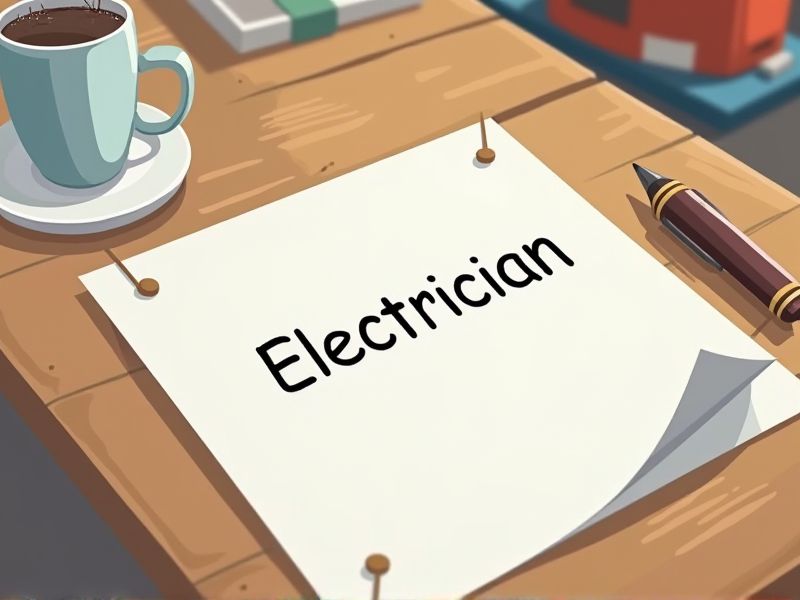
Electricians work in environments where safety and precision are paramount, often dealing with high-voltage systems and intricate wiring. Acquiring certain certifications ensures they possess the knowledge and skills to handle these complexities effectively and safely. Industry-specific credentials also help electricians stay updated with the latest regulations and technological advancements. Here are some pivotal certifications required for electricians.
Journeyman Electrician License
Obtaining a Journeyman Electrician License demonstrates proficiency and ensures adherence to safety standards, reducing the risk of electrical hazards. This credential is often a legal requirement, enabling electricians to work independently on projects without needing supervision. The license enhances career prospects and potential earnings by signaling competency to employers and clients. Licensing generally includes up-to-date knowledge of electrical codes and regulations, ensuring work is both current and compliant.
Master Electrician License
A Master Electrician License indicates a high level of expertise, allowing electricians to handle complex systems and ensure safety standards are met. The license serves as a credential that can enhance job prospects and earning potential within the industry. Holding this license provides legal authorization to work autonomously on electrical projects and oversee other electricians. Clients and employers often require licensed master electricians to guarantee compliance with regional regulations and insurance requirements.
Electrical Contractor License
An electrical contractor license ensures that electricians are qualified and authorized to perform work according to industry standards. It serves as a regulatory mechanism, reducing the risk of electrical hazards and ensuring public safety. This license provides a level of trust for consumers, assuring them that the electrician has met necessary training and experience requirements. Without this licensure, electricians might face legal and financial penalties, as lack of compliance with local regulations can lead to fines or work stoppages.
OSHA 10 Certification
The OSHA 10 Certification for electricians is needed because it equips them with essential knowledge about safety regulations, reducing the risk of workplace accidents. Employers often require it to demonstrate that their workforce adheres to industry-standard safety practices. The certification helps identify potential hazards specific to electrical work, promoting a safer work environment. It also fosters a culture of safety awareness, which can lead to more efficient and compliant job-site operations.
OSHA 30 Certification
OSHA 30 Certification is essential for electricians to enhance their understanding of workplace hazards specific to electrical work, thereby helping reduce accident rates. Employers often require this certification as it assures them of the worker's ability to adhere to safety regulations, leading to decreased liability risks. The training equips electricians with skills to identify and rectify potential safety breaches, potentially saving lives and preventing injuries. Electricians with OSHA 30 Certification can often access more job opportunities, as it demonstrates a commitment to safety and professional development.
NFPA 70E Certification
NFPA 70E Certification is required for electricians to ensure they understand the safety standards for electrical work and arc flash protection, reducing the risk of accidents and injuries. Electricians benefit from this certification because it enhances their knowledge of safety protocols, leading to safer work environments. Employers prioritize hiring certified electricians as they demonstrate compliance with safety regulations, minimizing legal liabilities. This certification also keeps electricians updated on the latest safety practices, contributing to continuous professional development.
First Aid/CPR/AED Certification
Electricians work in environments where electrical accidents are a risk, making first aid and CPR certification crucial for managing potential emergencies. Immediate response through CPR can maintain vital blood flow to the brain and heart in case of an electrical shock, increasing survival rates until professional help arrives. Knowledge of AED use is significant since electrical injuries can lead to cardiac arrest due to arrhythmias. Certification ensures electricians are prepared to handle such emergencies safely and effectively, prioritizing life-saving measures in high-risk situations.
Certified Electrical Inspector (CEI)
Certified Electrical Inspectors (CEI) ensure electricians adhere to safety standards, which reduces the risk of electrical accidents. Their certification signifies expertise in evaluating electrical systems, which prevents potential hazards in installation and maintenance. By following the CEI-approved guidelines, electricians can verify their work complies with national and local electrical codes. The presence of a CEI in the inspection process can also enhance consumer confidence in the safety and reliability of electrical services.
NICET Certification in Fire Alarm Systems
The need for NICET Certification in Fire Alarm Systems for electricians arises as it establishes their credibility and ensures they have the necessary technical expertise. Certified electricians tend to have enhanced job opportunities because they are recognized for their specialized skills. The certification also helps reduce installation errors, which can significantly impact safety and compliance with fire safety codes. As fire alarm systems become more complex, having certified personnel guarantees the systems are installed, maintained, and inspected according to industry standards.
Renewable Energy Systems Certification
Electricians require Renewable Energy Systems Certification to ensure they possess the knowledge and skills necessary to safely install and maintain renewable energy technologies. This certification helps maintain industry standards, which promotes consumer confidence and safety in renewable energy installations. As the demand for sustainable energy solutions increases, certified electricians can access more job opportunities in a growing market. Regulatory bodies often mandate certification to meet compliance with legal and technical guidelines in renewable energy installations.
Summary
When you obtain certifications as an electrician, you'll likely increase your job opportunities and marketability. Certifications often signal to employers your expertise and commitment to professional standards. This recognition can lead to higher earning potential and access to more complex projects. In turn, your skills may continually improve, promoting career growth and job satisfaction.
